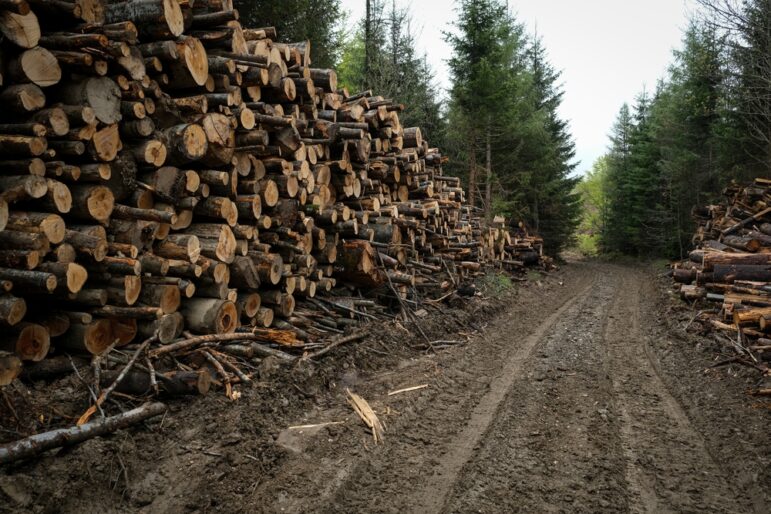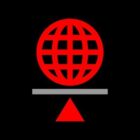
Deforestation in the Ciucas mountains, part of the Carpathian mountain range in Romania. Image: Shutterstock
Deforestation Inc. exposed how hundreds of companies worldwide use audits and certification programs that stamp their forestry products as sustainable, despite being denounced by governments and environmental groups for a wide range of destructive practices.
As part of the nine-month investigation, 140 journalists in 27 countries made freedom of information requests and gathered information on environmental violations by companies, import records about forestry products, court records, auditing companies reports, sanctions, and “green” certificates given to companies in the forest products industry. ICIJ’s data and research team reviewed nearly 2,000 case studies involving 410 companies alleged to have committed environmental violations in at least 50 countries.
ICIJ found that, over the last 25 years, at least 340 companies in the forest products industry were cited by government agencies and environmental groups for a wide range of destructive practices after auditors had already certified their operations and products as sustainable. Those companies were later accused of overharvesting old growth forests and other illegal logging practices, bribing forestry officials, importing wood products in violation of trade restrictions, and performing sloppy checks on suppliers.
Fifty of those certified firms were later fined or convicted by a government authority or a court.
Such cases are almost certainly undercounted, in part, because many government databases of environmental crime don’t identify the companies responsible.
How Did We Identify Information on Environmental Violations and Sustainability Certificates?
As part of the research done for the investigation, the team reviewed allegations tied to forest products companies accused of committing deforestation and other types of environmental degradation, as well as the auditors that monitored their activities and certified their operations and products as sustainable.
The analysis showed that 48 auditors had given their stamp of approval to forest products companies that had previously been charged with such violations as logging in Indigenous forestland and protected reserves, using false permits to continue cutting trees, and importing illegally harvested timber. The certification process enabled those companies to label their products as sustainable — ranging from paper cups to luxury yacht decks — even when it was unclear whether their harmful practices had been stopped.
As there is no centralized database with all the information tied to deforestation and other types of environmental degradation or crime, ICIJ built its own. With the help of media partners, the data team reviewed reports by environmental and human rights organizations, court filings, and local authorities’ databases tracking environmental violations and fines issued to companies. ICIJ and media partners also filed freedom of information requests to get these types of records when they weren’t publicly available.
Environmental violations data gathered from government websites included the Brazilian Institute for the Environment and Renewable Natural Resources (Ibama) in Brazil, and penalties reports from the Ministry of Environment and Climate Change Strategy from British Columbia in Canada, among others.
The reports by environmental groups and the government responses received by partners in different countries were shared through ICIJ’s communication platform, the Global I-Hub.
ICIJ’s data and research team created spreadsheets to structure, classify, and fact-check the allegations made against forest industry companies across the world. The team then cross-referenced each company’s name against “green certificates” databases maintained by organizations such as the Forest Stewardship Council (FSC), the Programme for the Endorsement of Forest Certification (PEFC), and others, checking for the time period of certifications and the auditors involved.
ICIJ classified those cases to see whether the certificates were valid before, while, or after the allegations against the companies were reported. ICIJ then focused on the cases that occurred while the certificates were valid, which were the only ones used for final analysis.
Using the Orbis database, ICIJ identified the parent companies of the auditors and the forest industry firms, which was key to review how many of them had certificates and were mentioned in the environmental groups and government reports. For example, many international companies rely on local subsidiaries in the palm oil sector, whose names then appear in NGO reports denouncing deforestation or harm done to Indigenous communities. This cross-check helped tracking multinationals’ harmful practices across borders.
What Were the Biggest Challenges?
When available, the quality of the data on allegations of environmental harm by companies in different countries varied significantly. Sometimes information on environmental crimes does exist, but governments or authorities don’t identify the firms behind them. Other countries don’t gather the data or don’t make it publicly available, which limits the possibilities to analyze global trends.
The information was available in different languages and formats. Besides employing automated translations, the data team was also supported by ICIJ’s media partners who helped to contextualize the data by understanding its limitations and how local regulations affected how information was collected.
ICIJ also analyzed data on the implementation of the current European timber regulation, which, since 2013, bans the import and trade of wood products linked to illegal harvesting. The analysis is based on monitoring reports that member states submitted to the European Commission from 2019 to 2021. According to an ICIJ review of government websites, only about half of the EU countries make those reports publicly available.
Looking at those EU reports, ICIJ found that from 2019 to 2021 officials in EU member states checked only a small fraction — less than 1% per year — of the estimated number of companies that imported and traded forest products in their respective countries.
As most EU reports contain aggregated data rather than a detailed narrative of each case, the analysis was very limited.
This story was written by Emilia Díaz-Struck, Delphine Reuter, Jelena Cosic, Miguel Fiandor Gutiérrez, Agustin Armendariz, Karrie Kehoe, Margot Williams, and Scilla Alecci. It was first published by the ICIJ and is republished with permission. You can see the original here.
Additional Resources
Supercharge your Environmental Investigative Stories with Data and Visuals
Illegal Wildlife Trafficking: A GIJN Guide
 The International Consortium of Investigative Journalists, a nonprofit based in Washington, DC, has directed the largest cross-border reporting initiatives in history, convincing reporters across the globe to set aside traditional rivalries to uncover corruption, abuses of power, and grave harms inflicted on the world’s most vulnerable people.
The International Consortium of Investigative Journalists, a nonprofit based in Washington, DC, has directed the largest cross-border reporting initiatives in history, convincing reporters across the globe to set aside traditional rivalries to uncover corruption, abuses of power, and grave harms inflicted on the world’s most vulnerable people.

